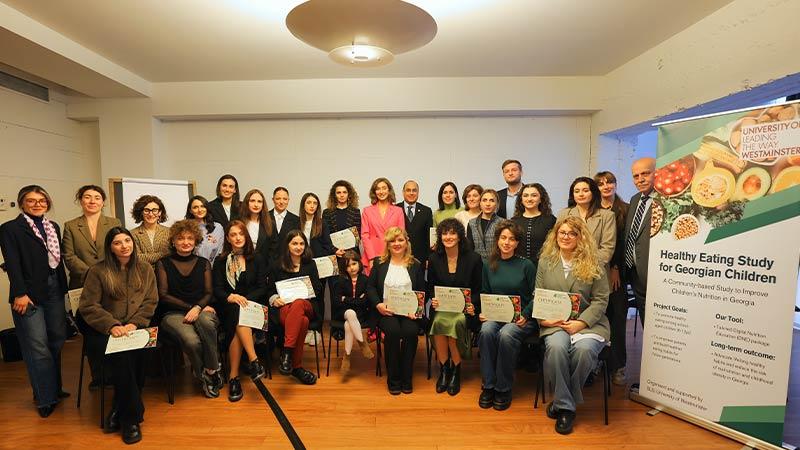Dr Ihab Tewfik, Senior Lecturer in Global Nutrition and Leader of the Community Health, Resilience and Wellbeing Research Group at Westminster, recently ran a workshop with a Westminster PhD student Rusudan Gvamichava on digital education on healthy eating for children aged six to 12 in Tbilisi, Georgia.

The workshop, which took place on 12 April, was titled Parent Perceptions on Digital Nutrition Education Packages (DNEP) and explored how digital tools could help parents support healthy eating habits in their children. This is part of a four-year PhD project named Healthy Eating in Georgia by Rusudan, who is a Public Health Nutrition PhD student at Westminster’s School of Life Sciences.
The workshop aimed to assess how well the study participants followed recommended healthy eating habits, and explored the strengths, constraints and receptivity of the nutritional programme on children and their families. It also highlighted how the programme empowered parents and children to make lasting healthy choices.
The Georgian Nutrition study started in January 2021 when Rusudan began researching for her PhD. The study focused on understanding how improved nutrition knowledge and practices could help address obesity and related chronic diseases in Georgia. The study revealed that the implementation of appropriately tailored nutrition education classes helped to mitigate obesity in a representative sample of school children aged six to 12-years-old in Tbilisi, Georgia.
Dr Tewfik and Rusudan regarded homes as a natural setting for building healthy habits, recognising that parents play a key role in shaping children's eating behaviours. In the workshop, parents perceived that the digitally delivered healthy eating classes increased the whole family’s nutritional knowledge for a healthy lifestyle and were convenient and easy to use. They also vowed to maintain using the digital nutrition online platform and asked to be kept in touch with all new developments.
The feedback from parents demonstrated that the intervention was well-received by most participants, who reported improvements in their children’s nutrition, eating behaviours and physical activity. Thanks to the DNEP, families found that they kept to better eating habits and children showed more confidence and improved at school.
During the workshop parents also highlighted areas where they needed further support, such as school food environments, time constraints and strategies to overcome children’s resistance to dietary change. The responses provided valuable insights for shaping future interventions and ensuring their relevance, inclusivity and long-term sustainability.
The workshop showed that children’s home-based nutrition can now be addressed using digital technologies. However, future solutions should be co-designed with families, schools and nutrition professionals to promote maximum engagement and enhance effectiveness.
About the success of the project Dr Tewfik said: “For Georgia, the adoption of online healthy eating classes through DNEP represents an immense opportunity to address overnutrition and obesity challenges, improve children’s health, enhance balanced nutrient intake, enrich their school performance and assist with healthy growth. So, building upon the foundation of this existing success story and new similar initiatives, Georgia is making notable strides in the right direction of healthy eating and is now setting the stage for further progress and impact.”
The outcome of the healthy eating project directly contributes to the United Nations Sustainable Development Goals (SDG) 3: Good Health and Wellbeing, 4: Quality Education and 10: Reduced Inequalities. Since 2019, the University of Westminster has used the SDGs holistically to frame strategic decisions to help students and colleagues fulfil their potential and contribute to a more sustainable, equitable and healthier society.
Learn more about the Nutrition and Public Health courses at the University of Westminster.









